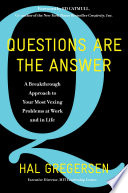

In 'Questions Are the Answer', the author emphasizes the transformative power of asking the right questions. Questions are not merely tools for gathering information; they are catalysts for innovation, problem-solving, and personal growth. The book illustrates how effective questioning can lead to deeper insights and more meaningful conversations. By shifting the focus from providing answers to formulating questions, individuals and organizations can foster a culture of curiosity and exploration. This approach encourages a mindset that values inquiry over certainty, enabling teams to navigate complex challenges with agility and creativity. The author provides practical frameworks for crafting questions that stimulate critical thinking and drive engagement, highlighting the importance of open-ended questions that invite dialogue rather than close it off.
Continue readingCuriosity is positioned as a vital skill in the modern landscape, where rapid changes and uncertainties abound. The book argues that cultivating curiosity is essential for personal and professional development. Through anecdotes and research, the author illustrates how curious individuals are more adaptable, resilient, and innovative. They are better equipped to learn from experiences and to engage with diverse perspectives. The author provides strategies for nurturing curiosity, such as embracing lifelong learning, seeking feedback, and exploring new experiences. By fostering a curious mindset, individuals can enhance their problem-solving abilities and develop a more profound understanding of their environments, leading to better decision-making and leadership.
Continue readingThe book delves into the role of questions in effective leadership. It argues that great leaders are not just those who have all the answers but those who can ask the right questions to inspire their teams. Leaders who prioritize inquiry create an environment where team members feel valued and empowered to contribute their ideas. The author discusses how asking questions can help leaders uncover hidden challenges, encourage team collaboration, and drive innovation. By modeling curiosity and openness, leaders can foster a culture that embraces experimentation and learning. The book provides examples of leaders who have successfully used questioning techniques to navigate crises and drive organizational change, illustrating the profound impact of this approach.
Continue readingThe book outlines how organizations can transform their cultures by embedding inquiry into their practices. It discusses the concept of 'inquiry-based leadership,' where leaders prioritize questioning as a means to engage employees and stakeholders. This approach encourages organizations to move away from top-down decision-making and towards collaborative problem-solving. The author provides case studies of companies that have successfully implemented inquiry-based practices, resulting in increased innovation, employee satisfaction, and overall performance. The book emphasizes the importance of creating safe spaces for questioning, where team members feel comfortable sharing their thoughts and ideas without fear of judgment. This cultural shift can lead to a more dynamic and responsive organization.
Continue readingInnovation is often seen as a product of creativity, but the book posits that it begins with asking the right questions. The author outlines how questioning can lead to breakthroughs in product development, service design, and business strategy. By framing challenges as questions, teams can explore new possibilities and identify gaps in the market. The book provides frameworks for utilizing questions in brainstorming sessions and design thinking processes, encouraging teams to think outside the box. It highlights the importance of divergent thinking, where multiple perspectives and ideas are considered, leading to more innovative solutions. The author also shares examples of companies that have harnessed the power of questions to drive their innovation agendas.
Continue readingTo sustain the benefits of inquiry, the book discusses the importance of building a questioning culture within organizations. This involves creating norms and practices that encourage questioning at all levels. The author provides actionable steps for leaders to cultivate this culture, such as modeling questioning behaviors, recognizing and rewarding inquisitive employees, and integrating questioning into performance evaluations. The book emphasizes that a questioning culture not only enhances creativity and innovation but also strengthens team dynamics and trust. By fostering an environment where questions are welcomed, organizations can ensure that they remain agile and responsive to changes in their industries.
Continue readingFinally, the book explores how individuals can leverage questions for personal growth and self-reflection. It encourages readers to ask themselves powerful questions that can lead to greater self-awareness and clarity about their goals and values. The author provides a variety of reflective questions that can help individuals assess their strengths, weaknesses, and aspirations. By engaging in this process of self-inquiry, individuals can make more informed decisions about their careers and personal lives. The book emphasizes that questioning is not just a professional tool but a lifelong skill that can enhance overall well-being and fulfillment.
Continue readingThe reading time for Questions Are the Answer depends on the reader's pace. However, this concise book summary covers the 7 key ideas from Questions Are the Answer, allowing you to quickly understand the main concepts, insights, and practical applications in around 23 min.
Questions Are the Answer is definitely worth reading. The book covers essential topics including The Power of Questions, Curiosity as a Core Competency, The Role of Questions in Leadership, providing practical insights and actionable advice. Whether you read the full book or our concise summary, Questions Are the Answer delivers valuable knowledge that can help you improve your understanding and apply these concepts in your personal or professional life.
Questions Are the Answer was written by Hal Gregersen.
If you enjoyed Questions Are the Answer by Hal Gregersen and want to explore similar topics or deepen your understanding, we highly recommend these related book summaries:
These books cover related themes, complementary concepts, and will help you build upon the knowledge gained from Questions Are the Answer. Each of these summaries provides concise insights that can further enhance your understanding and practical application of the ideas presented in Questions Are the Answer.